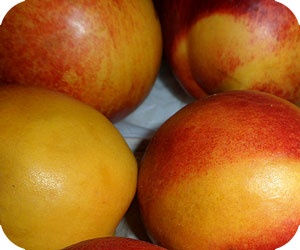|
Nectarine Nutrition:
Facts and Health Benefits
The nutritional value is
excellent as this fruit can provide many health
benefits. There are various vitamins in nectarines
including vitamin A and vitamin C which can benefit
health immensely. Please see the Vitamins in Fruit page
for further nutritional data and facts regarding the
benefits of vitamins. For example, vitamin C can
significantly aid the body's immune system by
strengthening it, which can consequently prevent
unwanted illnesses.
Nectarine Nutrition: Nutritional
Information
The powerful effects of fruit are
quite simply amazing and the health benefits of
nectarines should be enjoyed whenever possible. This is
a juicy sweet fruit which makes it an ideal fruit for
kids. The nutrients in nectarines are also fantastic as
the fruit provides a rich source of fiber which helps to
maintain a healthy digestive system, making it an ideal
fruit for controlled weight loss and a healthy diet in
general. Other health benefits include the fruit's
phosphorus and potassium content, as well as other
essential vitamins, nutrients and minerals.
|
|
|
Nectarine Nutrition: Facts
and Benefits
-
Nutrition Fact: Although
the fruit is very sweet, there are just 40 calories
in 100 grams.
-
Nutrition Fact: The fibre is high which means this fruit is perfect
as part of a healthy diet and even help with weight
loss.
-
Nutrition Fact: There are many
varieties and types of nectarines including yellow
and white varieties which are very popular.
-
Nutrition Fact: Some of the
names of nectarine varieties include Goldmine, Snow
Queen, Fantasia, Hardired, Flavortop, Mericrest, Sunglo and Sun Red Nectarine.
|
|
 |
|
Nectarine Nutrition: Carbs and Calories
in Nectarines
Nectarines are low in
calories and a little higher in carbs, and a very good,
healthy fruit whether its eaten raw, fresh, cooked,
canned or dried. The amount of calories in nectarines
depends on the method the nectarine is served or cooked,
for example if the nectarine is served in syrup or with
ice cream, obviously it will contain more calories. This
fruit is extremely low in fat and most of the calories
in nectarine comes from the sugars. The following
calorie guide can be used to calculate the amount of
nectarine calories and carbohydrates:
Nutritional Data:
Calories in Nectarine per 100 grams:
Flesh and skin,
raw nutrition: 40 nectarines calories / 9 carbs in
nectarine
|
|
|
Nectarine Nutrition:
Health Benefits and Nutritional Content
A nectarine
is a round stone fruit bursting with sweet,
juicy flavor. This particular type of stone
fruit is very similar to peach, in actual
fact, nectarine and peach can grow from the
same tree! The significant difference
between the two fruits is their skin.
Nectarines have smooth skin whereas peaches
have fuzzy, velvety skin. The taste and
juice content of both fruits are similar,
with the nectarine tasting a little more
acidic. The nectarine fruit is also known by
the botanical name Prunus Persican which
means Persian Plum.
The color of the
nectarine skin is similar to the mixed
shades of a peach which include shades of
yellow, orange, pink and red. The nectarine
tends to have brighter colored skin. The
flesh contains a lot of juice which makes
the fruit taste sweet and delicious,
particularly when it has fully ripened. The
flesh can be creamy white or pinkish in
color. A fairly large stone lies at the centre of the fruit which is also referred
to as the nectarine seed. |
|
|
|
Nectarine Nutrition:
Picking and Storing
Nectarine can be eaten in the same
way as peaches, except their skin is often more
desirable to most, as it's smooth and more palatable
than the fuzzy peach. Nectarine will keep for a few days
in the refrigerator or at room temperature, however,
once they've been from the nectarine tree, they no
longer continue to ripen.
Therefore, it's important to
pick nectarines which are ripe and ready to eat. The
skin of a nectarine should be firm with a little give,
it shouldn't be too firm as the flesh inside will not
have the same texture as a lovely ripe nectarine. The
skin should look bright, colorful and blemish free. |
|
|
|
Health
experts and nutritionists believe that a well-balanced
diet that includes at least five portions of fruit and
vegetables per day will help to considerably improve our
lifestyles and ultimately extend our lives |
|
|
|
|